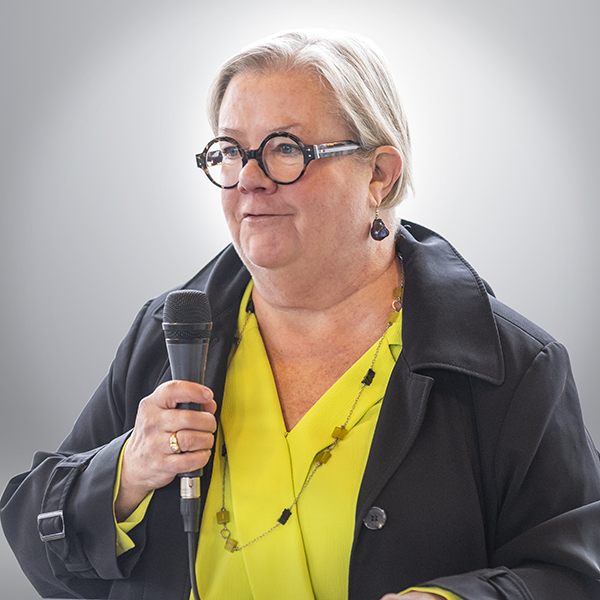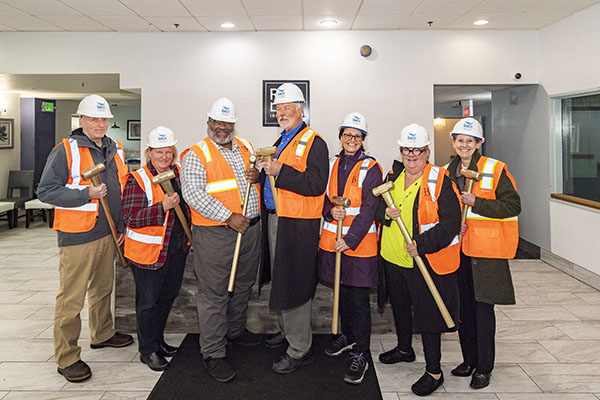Columbia Pacific Regional Housing Impact Fund marks four years of making a difference

In March, we celebrated the four-year anniversary of our Regional Housing Impact Fund. Since 2020, the fund has invested nearly $5.4 million, including about $2 million on behalf of clinical partners who share our commitment to addressing Northwest Oregon’s housing needs. Our housing grants have funded nearly 300 affordable-housing units (apartments) and supported local organizations that serve community members experiencing houselessness.
To mark the fund’s fourth anniversary, we sat down for an interview with Leslie Ford, Housing Strategy and Development Advisor. Ford joined CareOregon, our parent company, in 2019 after a decades-long career as a leader in the field of community behavioral health. She has overseen our housing impact fund since its inception. In that role, she has been a dealmaker, a problem solver and a thought leader – all of which have created momentum around affordable housing in the communities we serve.
Let’s start with a basic question. Why is Columbia Pacific – a nonprofit health plan serving Oregon Health Plan members – investing in affordable housing?
We really believe that housing is health.
Research shows that people who are unhoused have relatively high rates of hospitalization. They also tend to have lower rates of engagement with the primary-care system, and mental health issues or substance use disorders that really can’t be addressed without stable housing.
Research also shows that poor-quality and inadequate housing contributes to health problems, like chronic diseases and injuries.
Investing in housing is not just the right thing to do, it’s what our communities have said they need. We’re led by the priorities of the communities we serve, and for many years our communities have told us that affordable housing is an acute need.
What’s the goal of the fund, and how does it work toward that goal?
Our goal is to increase the availability of housing for Columbia Pacific members. That means it’s affordable housing and, in most cases, deeply affordable housing. We use the federal government’s definition of affordable housing, which means that tenants pay no more than 30% of their income for rent.
We encourage all kinds of folks in our region who are interested in doing something about housing, have a project idea, or are ready to develop a project to come talk with us. If we think their idea fits any of our focus areas, which are pretty broad, we’ll provide some financing support.
The fund is often a first source of capital for projects. Why is this “first-in” capital significant?
Some developers in our region have said that our financing acts like gravity for a project. We are not always the biggest contributors to a project, but we draw other financing in with us. If the state and others see that the local community has skin in the game, they’re more likely to fund a project.
In some cases, the support we provide helps developers gain site control and take other preliminary steps, like a geotechnical evaluation or site survey. You have to have all those things done before you go to the state Housing and Community Services division for funding. Developers who don’t have the capital to do that work upfront work are in a tough spot to go forward. That’s been one of the barriers to affordable-housing development in Oregon.
What are some other barriers?
We have come to understand that if you are going to develop affordable housing, it has to be paired with support services for tenants. Housing developers didn’t understand that for years. Often, that meant projects would get stood up, but they didn’t have adequate services and ended up with a lot of physical damage caused by tenants.
In Northwest Oregon, the difficulty in finding land is another big barrier. Between state forests and the tourist economy that includes vacation rentals and second homes, there’s not much land available to be developed.
Does Columbia Pacific prefer projects that pair affordable housing with support services?
We always pay attention to that element of a project. The projects we support financially may not always have everything in place from the start, but they have a plan to get there. And sometimes we help them get there.
The Hawk’s Eye Apartments project in Seaside is a good example. We have some units set aside for disabled community members and others set aside for health care workers. We are funding Clatsop Behavioral Healthcare to provide services to future tenants needing support.

Left to right: Don Bohn, Clatsop County Manager; Pam Cooper, Columbia Pacific Board member and Providence Seaside Hospital Director of Finance, Eric C. Hunter, CareOregon President and CEO; Steve
Wright, Seaside Mayor; Amy Dowd, CareOregon Chief Operating Officer; Leslie Ford, Columbia Pacific Housing Strategy and Development Advisor; and Mimi Haley, Columbia Pacific Executive Director, celebrate Hawk’s Eye Apartments groundbreaking
in November 2023
The Hawk’s Eye project has gotten a lot of attention because it’s an innovative model. What other innovative approaches would you like to highlight?
One model that I am very fond of is the Iron Tribe [Network] recovery-housing model. We’ve awarded two grants, totaling $900,000, to support Iron Tribe recovery-housing projects in St. Helens and Gearhart.
These projects are small – maybe eight to 10 bedrooms per facility – but they punch above their weight. The goal is to keep families intact or reunify families by supporting parents with substance use disorder in their recovery and journey toward self-sufficiency.
For a relatively small investment, Iron Tribe is able to purchase a building without taking out a mortgage. So, the rents clients pay to live there support the services that Iron Tribe provides to them. The model doesn’t require ongoing financial support from an external funder, which makes it self-sustaining.
Columbia Pacific has helped some of its largest clinical partners invest in affordable housing. How has this played out?
We have risk-share agreements with the major providers in Clatsop, Columbia and Tillamook counties. This is a way of engaging our clinical partners in a community view of how care happens and how costs happen. The goal is to have really well-managed care: care at the right place, at the right time, in the right amount.
Each year, we agree on a total cost-of-care target for each county. If our risk-share partners come in under target, they share in the cost savings. They get to use those savings in any way they want.
Our Clatsop County risk-share partners [Providence Seaside Hospital, Columbia Memorial Hospital and Clatsop Behavioral Healthcare] have done the lion’s share of investing in housing. Clatsop County has the state’s highest rate of houselessness [on a per-capita basis]. This issue is front and center for our risk-share partners there.
Recently, they approved a $1 million grant for Clatsop Behavioral Healthcare’s West Marine Drive project in Astoria. The project will create 33 units of supportive housing with a focus on disabled populations.
What role does Columbia Pacific play in helping risk-share partners invest in housing?
We review grant applications and make recommendations. But our partners make the final decision on investments.
Four years into your role, how are you feeling about things?
I’m optimistic. I really feel like the message we’ve been working to convey has been heard.
Gov. Tina Kotek has declared housing a priority. The state Legislature approved an enormous housing and homelessness package during the recent short session. It was the third session in a row in which the Legislature put more money into housing. President Biden is calling housing a national priority and key to his re-election campaign.
Recently, I’ve expanded my geographic focus to Jackson County. I’ve been working there to create the same kind of platform we have in Northwest Oregon.
Jackson County received state funding under the governor’s initial order declaring that the severity of homelessness crisis in Oregon constituted an emergency. The county’s MAC group [of providers focusing on homelessness] went to work on some ambitious, state-defined goals and has done an amazing job surpassing those targets. These kinds of successes are happening across the state, and the momentum around housing is building.
People get it now. They know we have a problem that we’ve kicked down the road for way too long.
Learn more about Columbia Pacific’s commitment to housing: colpachealth.org/for-partners/affordable-housing
